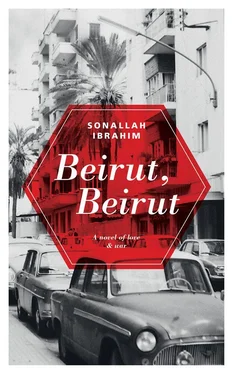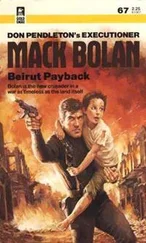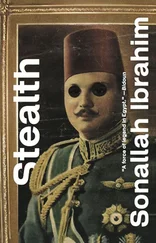“But there had to be some pretense of action: in Damascus, an unscheduled conference of rejectionist states was held. And King Hussein rode the Palestinian horse, calling for an Arab summit meeting. Statements were issued condemning the Israeli attack. The Egyptians sent a medical team to aid non-militant casualties. Everyone is pleased with the opportunity to weaken the PLO.”
A circle around a paragraph from the Israeli newspaper Haaretz : “No doubt the Americans were informed of the operation before it began. We would not be mistaken if we were to say that they knew, in a general way, the primary points that Israel would occupy in the sector along the border.”
A circle around a paragraph from an American newspaper: “The information provided to various Arab parties, and which reached them by way of the United States, informed them that the operation would be limited in duration and in geographical extent. That is why Syria’s rulers took a very low profile at first. On the first day, Syrian media devoted only a few sentences to it. Thus, the expansion of the operation from 10 kilometers to 40 was a surprise. America was either in collusion with Israel in a campaign of deception, or it had itself fallen prey to Israel’s deception.”
The town of Taybeh in South Lebanon. It looks like a ghost town.
The town of Qantara. Most houses are still standing, but the windows have no glass, and the entrances have no doors. Water pipes and faucets have been pulled out. Enormous holes in the walls. Shop doors torn away. Their contents plundered or destroyed. An Israeli jeep weighed down with televisions, refrigerators and furniture.
A circle around a paragraph from the Israeli newspaper Haaretz : “A soldier told us: ‘Looting has been a part of all of Israel’s wars. We had good luck here. I was in Egypt in ’73, and because of the bad living conditions in Egyptian villages on the west bank of the Suez Canal, we hardly found anything of value. We only confiscated blankets and sheets, and clothes that were sent to the country via the American air resupply route. They were excellent quality and worth millions of lira. They were distributed to tens of thousands of soldiers. During the long months leading up to February 28, 1974, the date of our withdrawal from the west bank of the Suez Canal, the Egged buses that carried soldiers to spend their leave in Israel were packed to the gills with those goods.”
A circle around a paragraph from the Israeli newspaper Davar : “Material and human assistance continues to be offered by the Israeli Army to Lebanese villages that have been damaged during the course of the recent battles. Yesterday, around fifteen prefabricated freestanding homes were brought from Israel to the Muslim village of al-Abbasa. The homes were set up on public land in the village. The first group of Lebanese families whose homes in the village were destroyed during the battles took up residence in them. Around 600 individuals remain in the village out of 6,000 who lived there before the outbreak of the war. Most of the inhabitants fled to Beirut.”
The US Secretary of Defense Harold Brown on American television: “The Israelis have admitted that they violated their agreement with the United States with respect to the use of cluster bombs in certain cases. The United States have examined with Israel Israel’s promises not to repeat this violation. But I don’t want to place any more emphasis than necessary on this matter. Because the important thing with regard to Lebanon is that there is withdrawal from this area.”
Title card:
Fragmentation bombs are considered the most dangerous and lethal weapons in the US arsenal. They are extremely effective when used against tanks and armored cars. If they are used in civilian areas, the result is a bloodbath.
These bombs were dropped from planes in cylinders, each of which carried a large number of slivers. At a certain height, these cylinders open up and each one releases 650 burning slivers, at 5.6cm diameter each. They fly outwards in different directions. One kind contains a timing device that makes the shards explode some time after the target is hit. Israeli planes used this kind in their bombardment of hospitals and children’s shelters in southern Lebanon.
A spacious dining hall. Several American and Israeli military officers and civilians surround a table piled high with different kinds of food. Enormous electric chandeliers hang from the ceiling. At the head of the table sits Mordecai Gur, chief of staff of the Israeli Army. He is making a speech to those in attendance, saying, “When I ordered the use of fragmentation bombs in Lebanon… I never had any doubt that it would be in keeping with the spirit of the agreement made between our two countries, and the spirit of the American people.”
Gur in an interview with a reporter from the Israeli magazine Al HaMishmar :
“Journalist: When bombing targets, did you make any distinction between the ‘ravagers’ and civilians?”
“Gur: I don’t have a selective memory. I’ve served in the army for all of thirty years. Don’t you realize what we did all those years? What we did along the Suez Canal? We created one and a half million refugees. We bombed Ismailia, Suez, Port Said and Port Fu’ad. One and a half million refugees.”
A circle around a paragraph from Haaretz : “Israel’s success lies in the fact that the United Nations — which in reality is the forces of NATO in blue helmets — is currently standing on the Litani River, not on Israel’s borders or within the Occupied Territories. Then there are the Christian pockets, and Israel is asked to pull back, but it hasn’t done so, and the Syrians haven’t gotten involved. Also, prominent Shia in Lebanon’s parliament have laid the blame on the Palestinians for the disasters that have befallen Lebanon. And the Druze cohort has issued a similar statement. Hostility to the PLO has become noticeably prominent among the Lebanese public.”
A circle around a paragraph from the Israeli newspaper Davar : “We must secure a peace treaty to be signed in the future with Lebanon’s government, which will make possible the joint exploitation of the waters of the Litani River.”
Title card:
“It is inconceivable that Palestine will remain confined by its present borders. For the Jews have the ability to spread out and expand into all the lands that surround it, from the Mediterranean to the Euphrates, and from Lebanon to the Nile. These are the lands that have been given to the Chosen People.”
— Norman Bentwich
“We will never abandon Israel.”
— Henry Kissinger
The final scenes of the film depicted the Israeli forces’ withdrawal operation from South Lebanon, and the arrival of United Nations forces to take their place. I suggested to Antoinette that these scenes should be removed, and the movie should end with the Israeli occupation at the Litani River. I said that that solution would elevate the film from being merely a record of events to the level of a vision of the future. Because Israel has a history of growing, expanding and swallowing up territory. If it left Lebanon in 1978 after a three-month invasion, then it left behind in its place “NATO forces with blue helmets,” as Israeli leaders themselves put it. Likewise, nothing could prevent them from coming back at any moment.
Antoinette concurred with me about this, and we agreed that I would buckle down in the apartment for two or three days, during which time I would finish writing the required voiceover.
I left her as she was winding the last reel of the film, and went back to the apartment. Wadia hadn’t yet returned from Amman, so I took a bath. I made a cup of coffee. I sat down and flipped through the pages where I had recorded the film’s scenes. I wrote down some observations, then I put the papers to one side. I made myself a light dinner and ate it, accompanied by two cans of beer. Then I headed to bed.
Читать дальше












